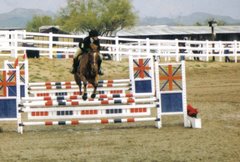Muscle Lab
This lab will show how temperature and muscle fatigue affect our muscles ability to contract. We will see first hand the differences in the rate they are able to contract when exposed to cold temperatures and after fatigue. These differences occur due to vasoconstriction and muscle fuel. Muscles use ATP as an energy source. ATP is created either anaerobically (only a limited amount) or aerobically (using oxygen) carried in the blood stream. Aerobic ATP lasts longer, but can only be produced so fast.
This lab will show how temperature and muscle fatigue affect our muscles ability to contract. We will see first hand the differences in the rate they are able to contract when exposed to cold temperatures and after fatigue. These differences occur due to vasoconstriction and muscle fuel. Muscles use ATP as an energy source. ATP is created either anaerobically (only a limited amount) or aerobically (using oxygen) carried in the blood stream. Aerobic ATP lasts longer, but can only be produced so fast.
Muscle Action-
1. When I clenched my teeth, my cheek muscle became rigid as opposed to soft when my jaw is relaxed
2. The length of the bicep shortened when the arm is bent. This is due to the muscle contracting and pulling on the lower arm to move it. The origin is where the tendon connects to the top of the humerus and the insertion is where the tendon connects to the ulna (this is the moveable bone) The biceps brachii contract while the triceps brachii relax.
3. The circumference of the bicep enlarges when the fist is clenched tightly as opposed to a relaxed state
1. When I clenched my teeth, my cheek muscle became rigid as opposed to soft when my jaw is relaxed
2. The length of the bicep shortened when the arm is bent. This is due to the muscle contracting and pulling on the lower arm to move it. The origin is where the tendon connects to the top of the humerus and the insertion is where the tendon connects to the ulna (this is the moveable bone) The biceps brachii contract while the triceps brachii relax.
3. The circumference of the bicep enlarges when the fist is clenched tightly as opposed to a relaxed state
Effect of Temperature on Muscle Action
Temperature Number of Fists
Normal 29
After Ice Water 20
Temperature Number of Fists
Normal 29
After Ice Water 20
Effect of Muscle Fatigue on Muscle Action-
Trial # # of Sqeezes
1 40
2 40
3 39
4 35
5 35
6 35
7 33
8 30
9 29
10 28
Trial # # of Sqeezes
1 40
2 40
3 39
4 35
5 35
6 35
7 33
8 30
9 29
10 28
1. Three things I observed while a muscle is contracted are: that the muscle gets shorter, the muscle which is contracted becomes more rigid, and muscle contraction becomes slower and weaker with fatigue
2. The cold temperature had the effect of stiffening the hand muscles and making them slower to contract. This is due to the fact that with decrease in temperature, the smooth muscle in the blood vessels constrict. If blood vessels are constricted, less blood is circulating which means less oxygen. Oxygen is needed for the production of ATP which is the fuel used by cells and is also required for the sliding of the actin myosin filaments that causes muscle contraction.
3. Fatigue had the effect of being able to complete less contractions and with a weaker force in the same time period. This could be caused by the muscle cell not being able to receive enough calcium to induce the sliding of actin and myosin (contraction), due to rapidly contracting the hand with no rest in between. Also, with no rest, the muscles have no time to recover, or relax which could cause them to tire.
2. The cold temperature had the effect of stiffening the hand muscles and making them slower to contract. This is due to the fact that with decrease in temperature, the smooth muscle in the blood vessels constrict. If blood vessels are constricted, less blood is circulating which means less oxygen. Oxygen is needed for the production of ATP which is the fuel used by cells and is also required for the sliding of the actin myosin filaments that causes muscle contraction.
3. Fatigue had the effect of being able to complete less contractions and with a weaker force in the same time period. This could be caused by the muscle cell not being able to receive enough calcium to induce the sliding of actin and myosin (contraction), due to rapidly contracting the hand with no rest in between. Also, with no rest, the muscles have no time to recover, or relax which could cause them to tire.

http://www.rogers.k12.ar.us/users/ehutches/musaction6.jpg
Works Cited
Mader, Sylvia. Human Biology 10th ed
About.com http://sportsmedicine.about.com/od/anatomyandphysiology/a/musclefatigue.htm

No comments:
Post a Comment